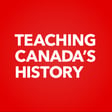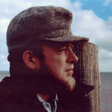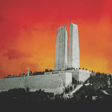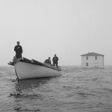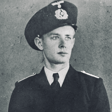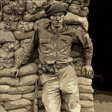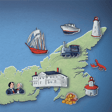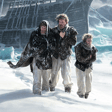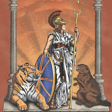Become a Creator today!Start creating today - Share your story with the world!
Start for free
00:00:00
00:00:01

Supporting Responsible Storytelling
This episode features Jessica Gonsales, Vanessa Kirtz, Amelia Adamowicz, and Ian Duncan — educators who are helping students uncover, interpret, and share powerful historical narratives.
Their conversation explores how teachers can support responsible storytelling and help their students grapple with the complex and nuanced histories that they are studying.
Transcript
Introduction to Podcast and Guests
00:00:11
Speaker
Welcome to Teaching Canada's History, the podcast where we explore how educators are bringing the past to life in classrooms across the country. I'm your host, Brooke Campbell. In this special series, we're speaking with the finalists for the 2025 Governor General's History Award for Excellence in Teaching, a national award that celebrates innovative and impactful approaches to teaching Canadian history.
00:00:32
Speaker
These conversations highlight how teachers and students are working together to interpret the past, connect it to the present, and share stories that matter. In this episode, I'm speaking with Jessica, Vanessa, Amelia, and Ian, educators who are helping students uncover, interpret, and share powerful historical narratives.
00:00:48
Speaker
Our conversation explores how teachers can support responsible storytelling and help their students grapple with the complex and nuanced histories that they are studying. Here's a glimpse into the rich discussion.
00:01:04
Speaker
Hi, everyone. Thank you so much for chatting with me today and for being willing to share more about your approaches to teaching history. Each of you brings a really distinct experience to this conversation, and I think we're going to find a lot of really interesting connections.
00:01:19
Speaker
But let's start with a quick round of introductions. Will you each introduce yourselves and share where you teach and what grades or what classes you
Inspiration and Teaching Approaches
00:01:27
Speaker
teach? And maybe we'll start with Ian and then we can go around from there.
00:01:31
Speaker
Hi, um I'm Ian Duncan. I use he, him pronouns and I teach at Garth Webb Secondary School in Oakville, Ontario. Oakville is a ah suburb of Toronto, so we're about half an hour outside of the big city.
00:01:44
Speaker
my My courses in the last few years have been largely grade 10 Canadian history and grade 11 ancient world history. I love them both, but I spend most of my time teaching grade 10.
00:02:01
Speaker
I'll go next. I'm Amelia, um or I'll say Amelia Adamovich, so the full name. I'm a teacher at Headway School in Edmonton, Alberta. I teach grades 7 to 12, social studies and Sikh history. It's a lot of fun.
00:02:19
Speaker
My name is Jessica Palat-Gonzalez. I teach in Surrey, British Columbia. And I teach Humanities 8. I also teach another form of Humanities 8 called Inquiry 8, that's the science.
00:02:34
Speaker
And i also teach 20th century world history, which is the grade 11s and 12s.
00:02:41
Speaker
My name is Vanessa Kurtz, and I'm a teacher at All Saints High School in Kanata, Ontario. And my pronouns are she and her. And I've been teaching the last few years. I've in total taught 15 different courses, but thankfully I'm down to ah Canadian history, grade 10 Canadian history, civics and careers, and intro to social sciences. And um history is a passion of mine. So I'm very, very happy that I've been able to get to teach for last few years.
00:03:08
Speaker
Wonderful. Thank you, everyone. um Whenever I talk to teachers, I can't help but think about my own experiences and my own past.
Project Inspirations and Descriptions
00:03:16
Speaker
And I can still picture my high school social studies teacher and the ways that they made me excited about my own learning and and thinking about the past.
00:03:25
Speaker
And so I was wondering if there was a teacher in your life who inspired you or maybe left a lasting impression on on how you teach today.
00:03:40
Speaker
For me, I feel like there was that experience in high school where i wasn't the best student. I got by, I was okay, but I was always very bored, and I always just wanted to go outside and like play soccer.
00:03:52
Speaker
um And so when I got into university, i started to experience... teachers who would come into the room and actually had some like excitement and enthusiasm in the way that they were teaching and I think that that definitely inspired me but it wasn't until my my actual practicum that I realized that creativity in the classroom was was such an important um part of who I wanted to be as a teacher
00:04:24
Speaker
And so one my teacher, sponsored teacher, or sorry, not my sponsor teacher, my faculty advisor, he, Phong Kwok, he actually teaches in the same district as me now.
00:04:36
Speaker
um He is one of the most incredible educators that I think I've ever met and just kind of pushed me to be that like enthusiasm enthusiastic, creative person that I am outside the classroom and just bring it into the classroom.
00:04:53
Speaker
um And then I also get to teach with some of the most creative people I've ever met in my entire life, and they just inspire me on the daily. So I think I'm very lucky to work where I work because I get to feel that every single day.
00:05:05
Speaker
Thanks. Anyone else have ah have a story they want to share or a person they want to talk about? Yes. It's, it's wild. Like I remember my high school history teacher, her name was Cheryl Day and she made me love history. And then she taught us what she knew.
00:05:21
Speaker
And I think that's sort of now that it was many, many years later, she's still and instilled that love of history in me, but like, it's the the quest to know even more. And what I guess I realized looking back is what she didn't know that she couldn't teach me. And so now I'm trying to know even more than, than she was able to access. And I mean, we're talking about the dark ages before the internet.
00:05:41
Speaker
um when those teachers relied only on you know books and research from their own sort of like university education to to teach history. and So it's like how that has changed is just that I have all that all this access to history that she didn't have access to to teach my students.
00:05:57
Speaker
So It's sort of like this awesome love of history I want to do with my students every day, but then also to know what she didn't know and to teach that as well. And I think that, you know, and that really has has tied into um a lot of what I do in the classroom now.
00:06:11
Speaker
Vanessa, you're up. For me, my mom was actually an elementary school teacher. And so she kind of raised, and my dad too, that both them love learning. And so they kind instill that in me. And so all of these teachers I've had, I've had a number of teachers over my life that have furthered that desire to want to learn more and to ask that question why. And I find that grade nine history teacher, Mr. Milks, I still say some of his sayings in my head.
00:06:42
Speaker
when I'm teaching, when I'm having those tough days sometimes. and um And then also my drama teacher in high school, we did two plays that were based on history. One was I Never Saw Another Butterfly about the Holocaust. And he had a Holocaust survivor come in. And that experience of seeing how art can bring about history and the and understanding and teaching. And we did another play called Quilters about women and how quilts, they told their stories through their quilts. And that those two experiences really opened my eyes to how history can be, than just more than reading books, right? It's about telling stories.
00:07:17
Speaker
And same with university, Professor Farrell, he was an amazing storyteller. I took three of his courses. I loved his courses so much. And that love of learning, and and even i had i had an amazing opportunity to work in museums. And so the women that I worked with in those museums, just opened up new doors to me and new ways of approaching history. And so all of those experiences have kind of come into, into my teaching experience. I think now being a teacher, I've incorporated almost, I i have little stories about each one of them that I think about when I, when I teach and, and they're, they're all really inspiring.
00:07:56
Speaker
I'll piggyback off of that. i I was finding it really hard to choose just one person and the same way because my parents are both educators as well. Actually, it's hard to find people in my family who are not.
00:08:08
Speaker
So it's like, oh, yeah, that person's an educator, too. But they all had different aspects, I think, that they shared and helped to inspire. But my dad and I were talking about, oh you know, like, who's inspired you the most? And it was really hard to pinpoint.
00:08:23
Speaker
Because at different times, kind of like in your learning career, you have different people who inspire you or push you further. And definitely, I'd say there's like three segments. So when I was a kid, definitely my parents, my dad loved museums. He always took us to museums.
00:08:38
Speaker
And there's a lot of that hands-on. also learned a lot from my grandfather, probably one of the people who's not an educator, actually. ah But I loved sitting with him and learning his stories because he was such a unique man in the way that he lived through World War two he'd gone through all this stuff, but he made, before scrapbooking like was a big thing, he made like these scrapbooks and he collected photos and he collected things and he would journal about it.
00:09:05
Speaker
And I thought it was really interesting. I love these stories. And then when I got into high school, talked to one of my um teachers about some of the stuff he's doing. He's like, well why don't you use that for your paper? And he's the first one who kind of like draw that link that you can take this stuff from home and use it to to feel further into what we're studying. was like, oh, that makes a lot of sense.
00:09:24
Speaker
And he's also the one who introduced me to crazy projects and other things outside of school. So like the UN n debates, all this stuff. He was a very inspiring person. University was the same thing. I had a wonderful prop who I still think of every now and then.
00:09:38
Speaker
He gave me some really cool tips of like how to get the kids back on gear, especially when they get distracted. And they're like, oh no, we're learning about another dead person. So boring. But he had like those best ways like pulling kids back in where he just throws something around. I'm like, what did he just say?
00:09:54
Speaker
And brings you back. So, like I said, it's kind of like cumulative. You look at everything and all the things that people give you and you're like, you kind of steal a little bit from everybody. And, or okay, not steal, I guess borrow.
00:10:08
Speaker
And you incorporate it. So it's hard to choose just one.
00:10:28
Speaker
Yeah, it really is. I feel like I just gave you all a historical thinking exercise and I didn't even realize it, um which is always really funny when you when you put it back onto the onto the teachers. So thank you all for ah least attempting to answer my very difficult question, but for reflecting a little bit and and sharing some of those moments from your own.
00:10:48
Speaker
you know journeys into the profession. um It's really, really interesting to hear how how different you know moments in your life have inspired you and have influenced how you how you teach to this day. um And I think it really ties well into thinking about the projects that you've done, because you've all developed these these projects that have students really dive into historical research and take ownership over how to share what they've learned in creative and critical ways.
00:11:24
Speaker
And so maybe you could all provide a quick summary of of what your project is and what your students have done. and maybe we'll go Jessica, Vanessa, Amelia, and then Ian.
00:11:40
Speaker
Okay, thank you for letting me go first. Okay, so when I try to describe this project, it's actually really hard for me because although I developed it, it's always kind of changing.
00:11:57
Speaker
um Even when I was like giving me information and the the the application. um I just, it's funny because like with every class, I change things up.
00:12:08
Speaker
What it is, okay, going to give you a backstory. So I have a very diverse group of students at my school. A lot of them just get put into my world history class as a filler for their schedule, or they're not all into history.
00:12:26
Speaker
As most teenagers or many teenagers, you know, they have They come in with different enthusiasms. um And so for me, being that student, um I always want to try and make sure that I am grabbing attention, i have them locked in,
00:12:46
Speaker
um but also have them like willingly participating and like you said, game like having some ownership over what it is they're actually learning. I also found over the years the grade 10 course, no offense to you who teach it,
00:13:01
Speaker
ah it has it goes over a lot of the the same or similar content. Yes, from a Canadian perspective, but you know the kids come into my class with a lot of information about the wars, interwar years, and a lot of that 20th century history.
00:13:18
Speaker
And so I wanted to find something that allowed the kids to... kind of go in their own direction or bring their own like histories with them into the classroom.
00:13:31
Speaker
But I also kept in mind the fact that they don't all want to be there. So, or want to share. And so, um
00:13:42
Speaker
I guess going back to the, I will explain it in a second, I promise. You can edit all of this if you want
00:13:49
Speaker
So I guess going back to the inspiration thing. um So my partner was a horrible student and like barely graduated high school. um No offense to him either, but great person.
00:14:04
Speaker
But um one thing that absolutely has him locked in and um enthusiastic about learning and sharing and, you know, just being part of something is fantasy football.
00:14:18
Speaker
and which a lot of my students actually have that as well. like They want to like build a team and get competitive and you know work against each other or with each other and gain points and you know having that that excitement.
00:14:31
Speaker
And so I kind of brought history and fantasy football together and created a project where in teams students create their fantasy influencer team And then throughout that throughout the whole semester, um they are responsible for trading and gathering points for their influencer, depending on how influential they believe they are.
00:14:59
Speaker
We have negotiations where other teams try and take points away. We have debates. I always started off with a project where they have to go home and actually interview family members.
00:15:14
Speaker
um because I know that a lot of their family members do have experiences from some major events of the 20th century. And so they bring those interviews into the classroom and we start to look at the influence of um like who was influencing like their parents, for example, um while they were growing up in different parts of the world.
00:15:34
Speaker
and so we we try to incorporate or i try to incorporate um some of that experience and learning um and just trying to have fun along the way and then we have trade days and deadlines and different projects that are associated with the whole um fantasy influencer league it's just it's really sorry i'm not done
00:16:01
Speaker
it's it's cool because In my opinion, obviously. um It's cool because they the kids teach me a lot. I don't sit there and teach them about so-and-so or this event. or They are bringing people in and talking about these influencers and the events that they're associated with and how that ties into our course and how that continues to affect our world and the people around us today.
00:16:29
Speaker
And I don't have to do a lot of that teaching. It's very much based in those benchmarks of historical thinking and research and just the students bringing their own interests
Impact and Community Involvement
00:16:42
Speaker
in.
00:16:42
Speaker
So now done.
00:16:49
Speaker
So is is I think it's my turn. That sounds amazing. I'm taking notes in my head, of course. but that's me um So my project is a soldier project. And I know there's been lots of soldier projects out up there that teachers have done.
00:17:03
Speaker
So it started actually 10 years ago when I was very fortunate to be a supervisor on a history trip to Europe. And we visited Groswick Canadian Moor Cemetery. And the history person that I am, my job was to sign all the students' soldiers, um that they were going to visit their grave and and do a little research on them and and and write a do something like a piece artwork or a story.
00:17:27
Speaker
And so... I, of course, decided I felt like I needed to let the family know that I was going and i was going to visit. And so through all this research, I found the family and I was able to find a picture of the soldier. And it kind of like it just made me feel good.
00:17:42
Speaker
Does that make sense? Like it it helped me know that this family knew that he was being remembered. So a few years later, after the 10th, That organization was created called Faces to Graves. And I reached out to them because I said, look, my students have already done some research on these soldiers. Maybe we could do some kind of connection.
00:18:00
Speaker
And we were supposed to go for the 75th. And I said, this would be great opportunity if my students could help your organization do some research on these soldiers. And so that's when the connection with Faces to Graves happened. Then COVID hit and our trip got canceled. And we were devastated. like The students were devastated. They were so excited to like the whole trip would it was going to be amazing. And as we all know, we all really struggled during that time. But I found this this project that I started with the students that were going on the trip overseas, I did it with my history class.
00:18:31
Speaker
I just seeing the impact it had on them kind of inspired me to keep doing it and working with Faces to Graves. And so it I'm sure we all deal with apathy with our students, and so this project makes the students feel like they're making a difference.
00:18:47
Speaker
So a really huge component of this project is that each students are assigned two students are assigned one soldier, and I try and find their families, or I find someone in their community that would be interested in our project.
00:19:01
Speaker
And so I connect with them and I give the students those information that the the community has or the family members have. And um they do research on the soldier using their military files.
00:19:12
Speaker
At the final end of it, of all this research, they come up with a final product, which is and what the Dutch called a life story, which it's called a biography, but the Dutch called a life story. And it's sent to the families.
00:19:24
Speaker
And what the really nice component of it is that the families write letters back to the students thanking them. And what's amazing about it, this is 80 years ago that these young men, um that there's their loss still impacts those families.
00:19:38
Speaker
And to see that the work that they've done has had such a moving or positive experience on these families makes them feel good. and And I think that's what motivates them through this whole project, knowing that the family is going to read it and that it's and then it's eventually published online on the Faces to Graves website.
00:19:56
Speaker
um And so over the last five years, we my students have written 189 life stories and over 300 students have participated in it. On top of that, that community experience, um we're very fortunate to be in Ottawa. And so the the Kingdom of the Netherlands is here in in Ottawa. So we've created a connection with them. And every year they donate tulips to us and a little side project.
00:20:19
Speaker
We did myself and another teacher, Penny Lessard, we made a ah garden. a teaching garden so that we could teach outside right so we can all get outside of our classrooms and teach outside and so students actually plant tulip bulbs in the name of their soldiers in the fall and we've had family members come plant tulips as well in the garden and so it um that that's that's a nice community connection we have people in our community that have written written us notes saying how much they enjoy the garden and and um their connection with the with the um with the netherlands um and uh
00:20:52
Speaker
We've also had some of our our students' work has been published online, not online, sorry, in books. A new book was just released, a Dutch book. And so seven of the life stories are written in that book. We've had them done in magazines and newspapers. And so um not only do students feel good about the work that they've done, but they also have, now they can say they have published work, that their work has been published online.
00:21:16
Speaker
So yeah, that's my project.
00:21:21
Speaker
Which is great. Oh, where to begin? This has kind of turned into like a life project now. And it started really simple. It was my first year of teaching. I noticed a lot of our kids at our school. And for reference, I work for a Sikh Punjabi private school. So the majority of our students are Sikh.
00:21:38
Speaker
We have some Muslim, some Hindu, some Christian, but I'd say about 85 to 90% are Sikh. So there's a major disconnect with the curriculum. And some of our kids were kind of like, oh, why are we studying this stuff? Like, I don't see myself in it at all.
00:21:51
Speaker
And a lot of the stuff around Canadian Sikh history was still fairly new at this time. So there wasn't a lot of books about it yet. There wasn't a lot of stuff. So I did a lot of late night reading, going to the archives, going to different places, going to different people.
00:22:06
Speaker
And I put together some research materials to get the kids interested in Canadian Sikh history. And I discovered a lot about it myself along the way. and And my principal came to me within about a week and he goes, hey, where'd you get all this stuff from?
00:22:19
Speaker
He's like, well, researched a lot and I gathered it. And he's like, do you think you could help the other social studies teachers do this for their classes? And me being naive, I was like, oh, yeah, no worries. I'll share everything. This is perfect.
00:22:32
Speaker
I got this. And before I knew it, it turned into a curriculum. So we matched up all the different outcomes for the different grades from kindergarten to grade 12. so that it was easier for teachers to implement and put teaching about Canadian Seek history.
00:22:47
Speaker
And then from there, a whole bunch of side products projects kind of shot up that I managed for a while. I've given some away to other people to manage now. So one of them was our Save a Food Garden project. So...
00:22:59
Speaker
And that came about learning about Sikh pioneers here in Canada. Some of the first ones to set up farms, like Harnam Singh Hari from Calgary, who was the first hog farmer in Alberta. And he arrived in like 1905. So our kids were like, oh my gosh, we've been here for a really long time. Like, yeah, you have. There's a long history for Sikhs in Canada. And a lot of them wanted to run that garden. And then...
00:23:19
Speaker
The stuff that we produce in the garden actually goes to the Gurdwara, where it's used for longer, which is the community kitchen. So anyone can come who needs a meal. They're a fad. So our kids feel like they're giving back to the community. But there's this history connection. And then they wrote about other Sikh pioneers and farmers.
00:23:34
Speaker
It's led to another project. It's massive. It's kind of compound to multiple grade levels now. And there's different sub-projects within it. So... We had a core group of students who were really inspired by the fact that there was Canadian history about Sikhs that they weren't aware of.
00:23:50
Speaker
So they wanted to form a group to do research. And then they wanted to do things where they wanted to write portions that they would put in their gudwara, which is their church, the Sikh church, ah newsletters about people in their communities and stuff like this.
00:24:04
Speaker
So that group is still going. It's written by another teacher now. And the latest project I have going with it is over the years, I've collected primary sources about Sikhs from all parts of the world. So they have like trading cards, for example. I don't know if you guys remember seeing years ago.
00:24:21
Speaker
They had the Sikh History Museum of Ontario, actually, where they have, ah they mentioned Kellogg trading cards going back to like from the 50s and 60s. And they featured Sikhs.
00:24:32
Speaker
So I found a whole suite of different companies over the years, going back to like 1895, that had trading cards featuring Sikhs from different regiments, from different parts of the world. And I collected these with permission of my principal and some other people donated things as well.
00:24:47
Speaker
so what we have is a history lab that our kids do. And that's probably the most fun part because this is where we snag some of our kids who are like, oh, I hate social studies. I'm a math science person.
00:24:57
Speaker
They don't go together and like, oh, they do. They totally do. so In this lab, we teach about primary sources, how they're maintained. We talk a little bit about the archaeology behind it, which is the fun part. I enjoy that.
00:25:10
Speaker
But the kids really get to to enjoy it because they get to handle these primary sources. So we talk about all the lab procedures around it. And then they go home as a second part, and they have to find primary sources at home. So they have to to go home, talk to people in the community, and write about these primary sources that we bring all these sources back at the very end and we kind of do like a data analysis of what we've discovered, how artifacts are preserved and how this affects societal change and things going on here and what we can learn from it contextually.
00:25:41
Speaker
And I have lots of kids who ask every year, oh man, are we doing the history lab again? It's like, yeah, I got some new sources and they're really excited about it. I had a couple of parents in our community who said, oh, you know, I'm going to India this summer.
00:25:53
Speaker
Can I bring you back some stuff? for your history lab. So having more and more community involvement coming in and helping us to build this history museum, which also led to a couple of our neighboring schools that we work with with through our sports and everything else asking, would we come and do our history lab with some of their students as well?
00:26:11
Speaker
Because they think it's a different process of doing things with, I should say this, hands-on learning, right? It's so much more fun because the students feel like they're actually involved in the history as opposed to, oh I just have a book or I'm just doing this.
00:26:25
Speaker
So it's kind of the whole lab experience, the hands-on, and then they're sharing this information. They're so excited to do it. So it's become a true passion. I don't know if i explained that well. You did.
00:26:40
Speaker
And um now I'll tell you about my project. um In my grade 10 Canadian history course, we spend a lot of time constructing and deconstructing narratives. Canadian history, asking the questions about those narratives and where they come from. Over time, that's just sort of grown towards maybe we need to pass along that narrative writing task to new information and new sources and a new voice because narratives are constructed. ah my My big motto is the the past is the past and history is a story written about the past.
00:27:09
Speaker
And so from there, the logical next step is so we become the storytellers. And so that launched the History Tellers Project. my This year, my classes partnered with the ARC Wives, spelled with a Q. It's Canada's 2SLGBTQ archive and the largest LGBTQ archive in the world that's independent. So they receive no government funding and and it's in Toronto and I've been partnered with them and using them myself for my own research since about 2017. There's a whole journey of being a queer person and learning queer history um when it wasn't taught to you by those who didn't know it.
00:27:42
Speaker
ah That has really been a big part of my my process. And so we partnered with the archives who engaged in archival work with us. The students did archival work, creating metadata and exploring primary sources and then selecting a source from the archives. so And then from there, they had to do all of the research.
00:28:00
Speaker
into these really, really nitty gritty, like sort of wiggly waggly, teeny tiny little, in some cases, stories from Canada's queer history. And we really reached as much as we could across the country into all kinds of intersecting communities with the 2SLGBTQIA plus community in Canada.
00:28:15
Speaker
the The neatest thing was was probably that the students got to select what stories they thought ah needed to be told from this massive archive of resources.
00:28:25
Speaker
We all chose primary source photographs. So, of course, you've got your yeah um primary source analysis to to get us started. But the research is tough because some of these stories literally exist on like Facebook um ah like eulogies in some cases or through an article that's also held in the archives.
00:28:43
Speaker
Because they just have never made it. Some of them have never made it into any kind of mainstream resource.
Ethical and Responsible Teaching Frameworks
00:28:48
Speaker
So we did feel like in a lot of cases, we were writing narratives that hadn't yet into sort of like culture of Canadian history.
00:28:55
Speaker
So I've really i really enjoyed that. ah Student groups were partnered with members of the 2SLGBTQIA plus community in Canada. They weren't all friends of mine. A few called in a few friend favors. But in a lot of cases, we were able to connect with some amazing people. The first the first lesbian premier in Canada's history, Kathleen Wynne, on 2SLGBTQIA.
00:29:13
Speaker
ah Edited a story with us, Michelle Douglas, who you may know from bringing about an end to the LGBT purge in 92. She partnered with us as well as Canadian Olympian and gold medalist and Senator now, Marnie McBean. So we were able to reach out and just connect with as many people as possible in the editorial process. And now the exhibits that have been created They Live Online, the archives website, hosts a digital exhibit of the student stories, which were actually very cool, all narrated also by 2SLGBTQIA plus identifying students from my school. So even when the students weren't themselves in that community, we made sure that every story was given voice and life to it by amplifying the voices of those queer students from and and trans students from my school. And then we also created a massive physical exhibit, which has just started. So now that the exhibit exists, we have 38 stories. We have got like 20 panels that we have exhibited in our in our school and school board. um They're going to be exhibited with the ARCWives in Toronto in the fall. And then they're going to be on tour. They're they're starting a tour. My board said we want first dibs.
00:30:13
Speaker
So next year, they're like, we want it to travel across the board. And then beyond that, I'm hoping that they travel even further, course. because it's digital exhibit as well. um Now everyone's like, well, when are you creating the activities works, ah worksheets, and lesson plans, so that I can send those along with it so that it can become something of, you know, greater use to lots of people, especially because, again, some of the stories are familiar if you do some digging into Queer Canada's history, but ah many are not, which is so great. We we learned a lot.
00:30:41
Speaker
That's like that. That's very high level of it, I guess.
00:30:46
Speaker
Thank you so much. Thanks, everyone for sharing. It's so funny how all of you had projects that like started out just as an idea. And then next thing you know, they've kind of snowballed into these massive initiatives. And I love how much everyone is nodding their head as, as you say things.
00:31:02
Speaker
It's kind of kind of fun to see, um you know, there's There's a lot of variety in the work that's taking place in your classrooms, but there's also a lot of these these commonalities about, I think your students are having conversations about what history is, Ian, what history actually is, and crafting arguments, telling life stories, contributing to public memory, recovering lesser known histories, you know, there's so much going on. And I, ah strand, I'll call it,
00:31:32
Speaker
that kind of, I think, stands out to me in all of your work is just these really big questions and big topics that are being explored, many of which are representative of difficult moments in history and or difficult um time periods, a lot of ethical dilemmas being considered.
00:31:54
Speaker
And I think a lot of teachers might be listening to this and would say, Well, I want to do something like that. You know, I want to include more perspectives. I want to bring in diverse stories.
00:32:06
Speaker
I want my students to feel represented in what we're talking about. I want to talk about, you know, controversial figures, and influential figures in history. I want to talk about these heavy moments, but I don't know how.
00:32:20
Speaker
And in particular, I don't know how to do it in a way that's thoughtful and respectful. So I guess bringing that all together, this thought of mine, my question is probably how do you help your students navigate the responsibility that comes with interpreting or representing historical figures, events, communities?
00:32:46
Speaker
And in particular, when those stories are so deeply personal or may or may not represent their own experiences. Go ahead, Ian.
00:32:57
Speaker
um Several years ago now, and it's become increasingly and entrenched, I think, in my course, because we don't just tell, it's not a course in queer history. So we're telling all kinds of stories throughout, you know, a five-month course. so I developed an anti-oppression framework.
00:33:14
Speaker
that I i live by And we've we've been talking more about doing good history. And I think what you're talking about, Brooke, is what good history looks like. Not just asking those questions, but also that representation and digging and looking for representation.
00:33:27
Speaker
I mentioned earlier, you know, like the idea that the sources of my learning from when I was in high school and even university were so limited and the internet has broadened it. I mean, without the archives, digital, you know, digitized archive of resources, I wouldn't even know that those things exist.
00:33:43
Speaker
so And I couldn't reach them across the country either. There's too much time and space between us. So the anti-oppression framework has driven us to lots of sources, not just one primary source, but many primary sources and secondary sources exploring those things together to look for sort of a way to consolidate a story.
00:34:01
Speaker
But then we call out oppression. And then we also always look at achievement, resistance and reparation. ah Through all of those things, it's it's ah it's a diagram with five fingers.
00:34:13
Speaker
Through those five things, we are actually able to ensure that we're not doing any harm. And I'm not there to convince people about their beliefs of any any particular community. But one of the things they go is like, yeah, if we call it the oppression, but we're not reinforcing the oppression when we always also look at how that group resisted that oppression or how that group achieved despite or in in the case of that oppression.
00:34:36
Speaker
and how we today, or even more recently, have worked to repair damage historically done. So like that has been the key for me in making sure that any history that's taught, including 2SLGBTQIA plus history and all of its intersectionality, that's I mean, that impacts a lot of identities.
00:34:54
Speaker
That has allowed us to approach those things in really responsible ways. Like in the History Tellers Project, we partnered with members of the queer community to ensure that my students who aren't all in the queer community, there that they accurately represented the voice of that community.
00:35:09
Speaker
So we had adult mentors who have lived many different pathways and many different lives bring their own sort of like, yes, you can say this. And it led to a lot of confidence in the students writing a story because otherwise they've just researched something, but how do they know that it's accurate or they have the right tone or that they captured the right the right words?
00:35:28
Speaker
And in some cases they got challenged and we drew that together. i mean, it helped that I was a part that community also, but don't think you have to be to do the work and to engage the community in that way.
00:35:40
Speaker
Yeah, that's really interesting. Jessica, you you want to want to share? I just want to say that I love that you've put that into a term that makes a lot of sense. like Calling it the oppression framework, I love that.
00:35:52
Speaker
I try and really use the benchmarks in my history classes just as kind of that, I guess, a similar framework and just finding that perspective and using the ethical judgment and like really teaching that to the kids at the very beginning and just making sure that everyone is sharing their story and everybody is respecting those stories.
00:36:11
Speaker
Because when we're looking at the different influencers, it becomes a bit of a game and it becomes, you know, trying to this game. like be the strongest team but in doing so you end up with some of these influencers that you know had pretty negative impact on the world and so making sure that we have perspective and we know what the the oppression looked like and how it affected the people and the communities and the world and continues to affect the world and how that's kind of built into our systems now and so just making sure that the kids don't just sit in that one moment but they actually
00:36:47
Speaker
expand beyond and like the the impact that that has had i think that i might have to steal your terminology that's okay something we developed because we had a lot of kids who asked a lot these kind of sensitive questions too as you go along we really encourage a debrief and kind of like feelings things so for For myself, even when I've run some of these projects, we we do. We have debrief sessions where you talk about your feelings, you talk about how's this turning into things.
00:37:16
Speaker
One of the side projects we I've also started with the kids is we do what's called a seek diary. So this is where we take everything we've learned in the course and what they do is Have you guys ever seen like those wizardology books or any of those other books that have like all the different laps and pages and things you can pull out? Okay, so I guess they make their Sikh diaries like this. So they have like little envelopes with little different thoughts or definitions or things that they found curious. And the idea is that they build it based on the things that really applied and are meaningful to them so we also focus a lot of this stuff on being meaningful to them to navigating some of these difficult ah questions so one really big one that became a real topic of discussion in a negative way but we were kind of able to come around it was operation blue star that's where ah stuff in india went really terrible there is the assassination of indira gandhi and then after that you had zeeks that were targeted
00:38:09
Speaker
And we had many who came to Canada as refugees. We had families that were stuck in India. And there's still a lot of fallout around this. So some of our kids, when they were talking to their parents about it at home, some of their parents, they actually came in they said, oh, you know, I lived through that.
00:38:24
Speaker
And one of ah my kids' parents, she was six at the time, so she remembers having to hide out in under the floorboards of this one house. And she said, you know, this brought up so many emotions at home that we didn't even know how to deal with. She said that I didn't know we're buried.
00:38:37
Speaker
So we have this initiative in the school now where it's like, you're going to be dealing with intense parts in the project. So it's so important to have that counseling team and also these debriefs, I think. especially involving stakeholders, parents, all these aspects.
00:38:50
Speaker
And I know it can seem really daunting because it's something I didn't think about originally when I started this project. was like, oh, this is going to be really interesting, but you don't think about how quickly it can devolve into that.
00:39:01
Speaker
So having that journaling aspect, having the debriefs, I think is such a key part to navigating those kind of difficult situations. having the open discussions and having people who are willing to have the open discussions. I have a couple of people on staff who that's not them.
00:39:16
Speaker
They're like, I feel so nervous. Can you step in and handle this? And it's like, yeah, I got this. No worries. Um, so I'll just mention from my perspective, because ah from the soldier project, um, that we do is that we do have, um,
00:39:29
Speaker
We've had probably about, I think about six or seven Métis or First Nations soldiers that we've ah the students have done research and and obviously not 14 or 15 students have looked at these file folders. and And it's a really important discussion to have that the way that was thought was acceptable to describe someone is not acceptable today and how to deal with that when we were writing or when students are writing the life stories and trying to determine what information should go in and how should certain issues like the way things that were described in their paperwork be approached um and and and in fact it's not just for obviously first nations and metis but just for any of these soldiers how how should we remember them
00:40:12
Speaker
right, 80 years after the fact. And um students have to have a lot of, we ah we often have discussions about, well, how should I write this? How should I write that? You know, that their family life is very complicated. It's interesting because so many, I'm sure as historians, we all, you know, get annoyed with like, oh, well, the traditional family. Well, there was no, like the traditional family is what we see today. There's, you know, multiple marriages. There's, you know, children who, you know, ah have like are are ah half siblings or are step and, and um those kind of discussions are had to how do you deal with difficult family situations and also sometimes families don't want information put into the life story. um I recount one where um and and it's often said that a lot of the soldiers drop out of school in grade four or five or six or seven around those ages um because they had to go help the family because they needed the money. It was during the Great Depression.
00:41:05
Speaker
Generally the kids are like oh that's so amazing that they gave up their education to help their family but One family is like, we don't want that in there. we don't want We don't want that put into the life story that he had to give up school because my our family was poor.
00:41:19
Speaker
So it's interesting how those kind of discussions have to have be had in sensitivity on how on how their stories are told. and And we actually have access to their medical records too, right? There's some really personal information that is sometimes shared in those and those stories. and and and so we have it and so some of the kids are like what does this mean miss and then so explained to them you know like well they you know it means they had an sti and they joined the military and or that's why they were in hospital a while or you know when they were in the military and so having those kind of discussions and and talking about um you know uh although you're getting ah an idea of what their life was like maybe those things are not
00:41:58
Speaker
the things to include in their life stories as well. um So that has to be understood as well. And and there's lots of trauma for these families. Some of our soldiers were killed accidentally. and And so the families actually say specifically, we do not want the other soldiers' names put in the life story.
00:42:15
Speaker
And of course, we wouldn't have anyways, but it's important to have that discussion with the students when they broach that. Like, do we put the person's name in? And and and so we have a discussion about you know, what what is and what's important to the story, right? and and and And so there's we have those kind of often quite discussions with most of the soldiers about what should be included, should not be included in in there in their life stories.
00:42:38
Speaker
um So it's interesting to see that application of critical thinking, right? Of of what what whats what how do we want these soldiers to be remembered in the end?
00:42:50
Speaker
And Ian, I wanted to say i loved I love that framework as well. um i can't I have something similar that I borrowed from another teacher. I saw a video and I can't remember and it's resistance, resilience, revolt. are the the three R's we talk about.
00:43:03
Speaker
And so when we're talking about those First Nations soldiers or the Métis, and even one of them one of our Cherise soldiers, he was the great, great nephew of Louis Riel. So including on the life story, and how do you write that in the life story, right? And what does that mean that you know um that some of these First Nations soldiers um soldiers, like, what was their experience like? Why did they sign up knowing what the conditions were like? And we take it from that perspective of resistance, resilience, revolt.
00:43:30
Speaker
So that's, yeah, I can imagine there's a lot of these really, going to use the word heavy conversations, even though it might not always feel heavy. But you know, you're, you're in this tension, and you're you're talking about the suppression framework, you're talking about the benchmarks, you're talking about representation and and personal stories. And I would imagine that in talking about all this with your students and in uncovering this work, there are some really rich moments or or stories that might stick with you about things that maybe your students discovered or created or moments, reflections.
00:44:07
Speaker
um Would anybody like to share you know anything along those lines that they but has really stood out to them in their work, whether it's for this project or just in your work in general as well?
Reflections and Teaching Passion
00:44:19
Speaker
Go ahead, Amelia. Looked like you were going to jump in.
00:44:24
Speaker
Well, for me, I think it's just going back to like, even talking to like other teachers, like I know sometimes it feels daunting to start these tasks. Or like I said, you're naive like me and you go, oh yeah, I got this. It's totally fine. And then you get in there and you're like, oh my God, i don't know what I've done to myself.
00:44:39
Speaker
But yeah. I think honestly, being brave enough to take that step to do it, it's meaningful and it creates those connections. Like I didn't know how much support I think I had with the different parents, different community members until we started this project.
00:44:53
Speaker
And that's kind of eye opening too, where you think, think sometimes in the classroom especially you're teaching day to day that you're kind of on your own and then you realize you're like oh there's so many different people that we can go to and so many connections we can make and sometimes we forget that connection and i definitely i think that's the best asset that we have is that you can rely on so many other people to help you out when you really need it and like I said it's eye-opening because there are definitely times where you go oh my gosh I'm so alone and I have no idea what I'm doing and you feel like you're gonna burn out and spiral out and then you just walk down the hallway and there's like oh I can help you like oh thank god
00:45:28
Speaker
Yeah, I'm sorry, I kind of got lost with the question. But I think you're asking about is there community members that kind of assist with our with our projects? Is that you're asking?
00:45:39
Speaker
Yeah, yeah, please. Yeah, sure. Yeah. yeah so I am not a military historian at all. And so when I started this project, I was totally lost. I i could do the social aspect of it. I had no problem with the, you know, like before they joined the military, but once they joined the military, I was lost.
00:45:58
Speaker
And so I was really fortunate to get into contact with community members. Same thing, right? um And anytime anyone hears about these projects, they're like, oh, we'll help. Or what, you know, but what what do you need help with? And and we can help you with it.
00:46:12
Speaker
And so I was really, really fortunate to have Faces to Graves actually linked me up, Kurt Johnson. He's ah a former editor at the Ottawa Citizen. And and so I learned a lot from him. And so he taught me a lot about how to write books.
00:46:26
Speaker
how to write effectively and, and succinctly and in the in, and therefore I become a better teacher because I can point that out to my students. And he also works with my students as well. And then goes through things like, okay, you don't do this, don't do this, or this is how you do it or, um and having that and he so he does a Google meet with my students.
00:46:46
Speaker
um I also have a a retired colonel um who comes in and talks to students. And he he was in and Europe for a while. And so he talks about um some of the battlefields that he's been at and was able to give that experience. And also with the military terms, because I'm like, I don't know what this means.
00:47:04
Speaker
So I said to the kids, okay, if you don't understand something, and this is what i love about this project, because there's so much, um I think it's called the the learning space. where, you know, you haven't learned it yet. And so you're at that frustration part. And i and i love I love that part. And I try and teach my my students that's the fun part, that the frustrating part where you can't read the cursive writing, right?
00:47:27
Speaker
You can't, you don't understand what a certain acronym means. And so that sitting in that frustration and and and then finally figuring out strategies and how to get those answers so like referring like i said okay email the colonel i call the colonel email the colonel and ask him what he thinks or we'll email um kurt and ask him like how should we approach this and so um and also family too right like uh i don't understand what this means about the family like the spelling of their siblings right their you know, their recursive writing. So I said, okay, well, you need to reach out the family and ask them, you know, what are the, how do you spell their names? And um so community has had a huge, a huge help for me on my learning curves like like this when I was learning about military history and and my students too. And they come out of this project so proud because they have been frustrated and I have them do a little reflection after about, you know, what have, what were the things that frustrated you and and how did you deal with it? And they're, reading their responses at the end of the project and saying like, this is how I dealt with it. And there's so, and you can read it in their, in their reflections on how proud they are that they were able to figure out a strategy, even if it meant asking other people, right. And that's important for them to understand is that, um,
00:48:39
Speaker
it's okay not to know. Don't make it up, right? Ask. There's other people out there that you can ask for help. and um And it makes, and it helps other people feel part of the process as well. And they feel like they're making a difference. So I think I agree that community aspect, because I, like, like I said, I'm not a military historian. So I've learned an incredible amount.
00:49:00
Speaker
ah Kids are shocked now. They're like, oh, miss, what's this say? And I can actually, I know what it is now. I'm acronyms come up I'm like, oh, I know that that's basic training camp. but
00:49:14
Speaker
That's great advice. I think both from you, Vanessa and from you, Amelia, is just to to ask for help and to to go outside. I know, Ian, you've you've done that as well. and um Jessica, you mentioned your you know your students are coming and they're bringing their interests into the little classroom.
00:49:29
Speaker
So thank you for for sharing those. And thank you all for for your time and your ideas and and just your openness today. I think this has been a really thoughtful conversation. And I i imagine our listeners are going to have a lot to reflect on. um But before we go, I have one more question that I want to ask. Just a quick rapid fire. Can you share in one word?
00:49:50
Speaker
why you teach history i love the thinking the thinking faces i feel like i need to start the jeopardy the jeopardy theme song and i can give you a couple words if you really want it but oh no i i have one to start if if for right now the it was the first word that came to mind it was the word story um yeah story and and i said it before but helping students understand that they can write new historical narratives from the generation a new generation of Canadians, that they can revisit the past stories and add to them and dig more deeply into them and construct them in ways that they can understand it for a new generation of Canadians. I think that that's what makes history relevant always, rather than just accepting the narrative that has always been given and passed down to keep digging. And it sounds like with all of the story, all of the projects that we're talking about today,
00:50:41
Speaker
um Everyone is is having students write write story and engage with story in wonderful ways. So story is my word. going to stick to it.
00:50:54
Speaker
Yes, Jessica.
00:50:57
Speaker
I'm going to continue with that and say perspective. um Just because I feel like there's so many untold stories that haven't been told. And so finding, finding those stories and and making sure that they're shared and screamed from the rooftops.
00:51:15
Speaker
I'm going to go with awareness because you need to be aware. and There's so much awareness of self, awareness of others, awareness of society, community. And with this awareness, as it grows, you learn more and others learn more.
00:51:34
Speaker
um might say, uh, impact, impact. That, um that learning is important because you need to know where you've come from in order to know where you want to go in the future. And if you want to make an impact, you need to know that.
00:51:49
Speaker
and love that. Those all do really, um, and mesh really well together, which is, which is lovely. Um, and Oh, that's so nice. It's such ah such a beautiful way, a beautiful way to end this episode. So thank you again, Jessica, Ian, Amelia, and Vanessa.
00:52:11
Speaker
And thank you as well to all of our listeners. We look forward to sharing more stories from the classroom in our upcoming episodes.

